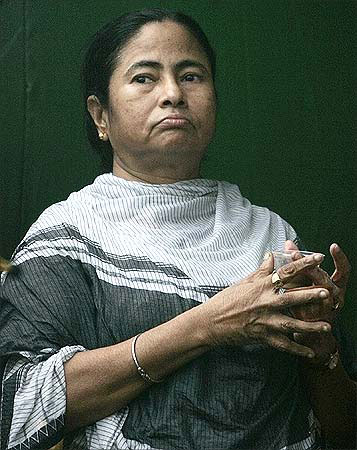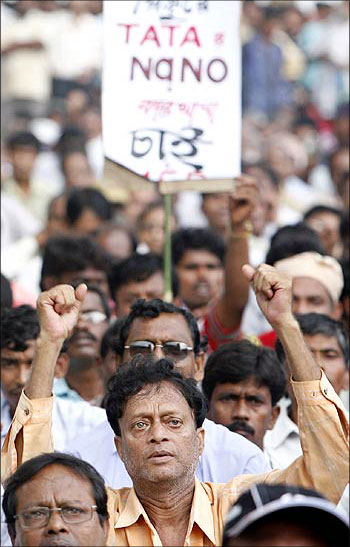
Ironically, it took the ruling Left Front's industries minister, Nirupam Sen, a tough Marxist with a beguilingly pleasing manner, to remind us that West Bengal is poised uneasily on the cusp of change.
What he didn't say in the Assembly on Wednesday last was that the Trinamool Congress rule might mean jumping from the frying pan into the fire. Or it could be more of the same.
No one knows Mamata Banerjee's thinking on economic matters. Or, indeed, if she devotes any thought to policy between pouncing on car bonnets, dragging MPs by their collar into the Lok Sabha's well, and flaunting a red band round her head to signify a supposedly close encounter with death at the hands of her enemies.
Her indefinite fasts begin in a blaze of publicity and peter out in obscurity.
Calculation inspires these histrionics. She masqueraded in a burqa to court Muslims who comprise 25 per cent of the population and traditionally vote Marxist.
She whips up provincial passion like the Shiv Sena, championing peasants in Nandigram and Singur and vowing to defend Bengali retailers who feel threatened by supermarkets and shopping malls owned by the Ambanis and Goenkas.
. . .

But is there anything besides populist posturing to this plump shabby figure whirling through Bengali politics like a storm?
There may well be. After all, she enlisted Sam Pitroda's services. She also seeks to recruit as many retired bureaucrats as will heed her pleas, presumably because of their administrative experience and because they can lend gravitas to her motley crew of dissidents, malcontents, rebels, ideologues and opportunists.
Her only ambition I have seen reported -- to turn Kolkata into London -- endearingly reflects middle-class Bengali faith in Dick Whittington's conviction that the streets of London are paved with gold.
If Ms Banerjee says no more, I would like to think it's because she believes with Talleyrand that speech was given to man to conceal his thoughts.
Singapore's Lee Kuan Yew was dismayed when visiting India before the 1996 elections, he found Lal Krishna Advani and Atal Behari Vajpayee denouncing Narasimha Rao's reforms. "Oh God!" he told me, "This is back to Square One again. It's going to be one step forward, one step back!"
Advani knew Lee had got him wrong. But as he explained afterwards, the BJP was debating the merits of Swadeshi and multinationals, and he thought it wiser not to commit himself to liberalisation.
. . .

In any case, he could hardly admit even to himself that India's Opposition must oppose, irrespective of merit or logic.
So, for all we know, Madam Mamata may have bright ideas tucked away in her saree. She dropped hints amidst the furore of Nandigram and Singur that she is not against industrialisation as such.
She objected only to the manner in which the Left Front acquired land and dispossessed peasants. If memory serves me right, she didn't say anything uncomplimentary about Indonesia's Salim Group or voice suspicions about the nature of their deal with the West Bengal government even as she chanted slogans in pouring rain outside the Taj Bengal where Salim's CEO, Benny Santoso, was staying.
She was fixated on land and peasants.
But even she must know you can't make an omelette without breaking eggs. Some land will have to be transferred from agriculture if an industrialised West Bengal is to generate jobs for its unemployed.
Objecting to industry would be, as Sen told the Assembly, "like cutting the branch of the tree on which they are sitting."
. . .

It's a pity that did not occur earlier to the Left Front. It's a pity they suborned education, politicised the police and administration and destroyed almost all institutions of state during 30 years in power.
But Trinamool's ascent may not be so easy. The Left Front's recent spectacular setbacks are mainly in urban areas. The CPI(M)'s bastions are in the countryside where party cadres backed by peasant beneficiaries of land reform will fight tooth and nail not to be dislodged. West Bengal can expect many more Nandigrams.
Even if the Trinamool takes over, it will be as vulnerable to the blandishments of traders from outside the state as the Marxists were.
I remember an Indian Chamber of Commerce meeting before the last election when some expected the Trinamool to win. All the moneybags I had seen paying court to Jyoti Basu were there, obsequiously giggling at Mamata Banerjee's jokes at Basu's expense.
As the French saying has it, Plus ca change, plus c'est la meme chose. The more things change the more they are the same.